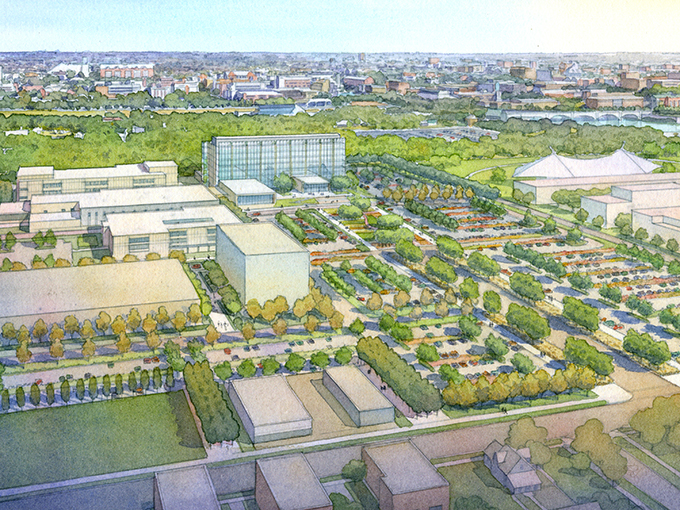by Greg Ballard
It is often said that justice delayed is justice denied. The same could prove true about the Marion County Justice Complex project, which is now in the hands of the City-County Council.
During my administration, we have established a tremendous track record of working with the Council to tackle big projects that have been kicked down the road for 20 or 30 years. In doing so, we have stripped undue political influence out of the most basic city services, and we have protected taxpayers for decades to come.
Our water and wastewater systems were highly politicized and broken. We took on the challenge, first by renegotiating the city’s existing EPA Consent Decree, saving ratepayers more than $800 million and carrying out one of the city’s most important environmental projects.
We subsequently transferred water and wastewater assets for $1.9 billion to Citizens Energy Group – a move that is saving ratepayers millions annually beyond original projections and has provided record-levels of investment in infrastructure through RebuildIndy. Prior to RebuildIndy, the city repaired on-average one or two bridges annually. During a 2 ½ year period, RebuidIndy resulted in repair work on 60 bridges, road resurfacing throughout all parts of the city, sidewalk repair, and construction of new trails and bike lanes. This investment in neighborhoods combined with new mobility and connectivity options are drawing millennials and seniors into the city at a rate not seen in decades.
Parking meters were another broken, highly politicized system. Together, with the Council, we took on this challenge and created ParkIndy – a P3 partnership that has grown Indy’s parking meter revenue from $330,000 in 2010 to $3.3 million in 2014. And unlike other cities that opted to fix their parking systems by negotiating an up-front, one-time payment, Indianapolis created a revenue stream for future councils and mayoral administrations to direct.
We have proven that we know how to take on big challenges and address them in a way that results in enormous savings and efficiencies. The Justice Center is the next big fix, and after more than two years of work based on firm commitments from all of the project’s stakeholders, now is the time to get this deal done so that future mayors, future councils and future generations of residents are not burdened with it.
Some have suggested that this project should be delayed until after the coming mayoral election, but calls to put this project back in the political arena at this point indicate a willingness to sacrifice the city’s long-term financial health and public safety in exchange for short-term political gain. Make no mistake: delaying this project likely will kill it. If it somehow survives, the same project will cost hundreds of millions of dollars more and be full of political patronage.
We approached this project from day one in a genuine spirit of partnership with our stakeholders – the Sheriff, Courts, Council, Prosecutor and Public Defender. We all agreed, and we signed an MOU affirming our commitment to move forward. Together, we engaged in a competitive bid process. Together, we selected a winning bid team. Twice, all of the project stakeholders unanimously agreed to move forward in this direction, with this bid, using this P3 delivery model. The project has been public, open, transparent, and collaborative, and stakeholders have been engaged throughout the project, with more than 240 briefings and public meetings.
Why would we invest so much time and energy in one project? Because our current system is inherently unsafe. For more than 30 years, Indianapolis has needed a new jail and space for our courts. Inefficient, failing facilities threaten our public safety and carry a hefty annual operating price tag of more than $50 million – a number that will only rise in coming years with inflation and continued deterioration of physical assets. After decades of controversy that have included Federal court oversight and hundreds of millions spent on the court and jail systems, a comprehensive solution to our justice system’s inadequacies is within our vision and our grasp. After two years of study by all stakeholders and a yearlong competitive procurement process, we have a hard, committed bid in place to fix these ills. And as the City-County Council debates the proposed Justice Complex, taxpayers should demand that all political baggage be checked at the door.
Those who have tracked the Justice Center since its inception know that procedural delays have already blocked taxpayers from receiving at least $1.5 million in annual savings for the life of the project because of lower interest rates. In total, that’s $52.5 million we could have used to help fund IMPD officers or Pre-K education for low-income children. Doing nothing carries an even higher price tag. Operations costs will begin to accelerate in 2016 due to critical Jail I repairs, and that trajectory will saddle taxpayers with as much as $860 million in annual expenditures by 2050. Backing away from the bid now also places the reputation of the city at risk. At a time when P3s are becoming widely accepted as the way to address legacy infrastructure problems, the Justice Center project has drawn international attention. Who, in the future, will want to work with a city that walks away from a high-quality, committed bid?
By all means, the Council should ask tough questions and verify the financial calculations. But those advocating delay should bear the burden of proof to show that they have an alternative plan, and that they can deliver. It is an injustice to taxpayers to delay for the sake of politics.
Gregory A. Ballard, Mayor
City of Indianapolis














